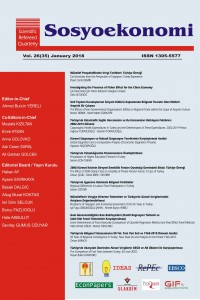Abstract
This article explores one of the most significant problems of contemporary global capitalism, namely ‘secular stagnation’, in the light of theories of the three different schools of economic thought (Neo-classical, Post-Keynesian and Radical Political Economy). In the age of stagnation, the ability of global capitalist system to maintain its stability and survival has declined significantly. The long-run stagnation has weakened the consensus among social classes, leading to a ‘political crisis’ and an increasing authoritarian tendency in contemporary capitalism. This paper divides modern orthodox theoretical explanations of stagnation into three categories: demand-sided theories (Summers/Krugman), supply-sided ones (Gordon) and theories denying the existence of stagnation (Bernanke & Rogoff). Although some leading orthodox economists accept that there has been a strong tendency of stagnation in advanced capitalist world since the start of this century, they neither consider stagnation to be a consequence of capitalist accumulation process nor one of neo-liberal variant of capitalism. In contrast, analyzing stagnation from a wider perspective with historical, social and political dimensions, heterodox theories have stronger theoretical foundations than those of orthodox theories. While Post-Keynesians argue that stagnation stems from structural/chronic demand deficiency caused by neo-liberalism enhancing income inequalities, radical political economists emphasize that stagnation is a ‘systemic’ problem inherent to monopoly, mature capitalism.
Keywords
Global Stagnation Summers/Krugman Hypothesis Post-Keynesian Economics Radical Political Economy
References
- Eklenecek...
Abstract
Bu makale üç farklı iktisadi düşünce okulunun (Neo-klasik, Post-Keynesyen ve Radikal Politik İktisat) teorileri ışığında çağdaş küresel kapitalizmin en önemli sorunlarından biri olan uzun-dönemli stagnasyon olgusunu incelemektedir. Stagnasyon çağında küresel kapitalist sistemin istikrarını koruyabilmesi ve hatta yaşamını sürdürebilmesi giderek zorlaşmaktadır. İktisadi stagnasyon sosyal sınıflar arasındaki oydaşmayı zayıflatarak, bir ‘siyasal krize’ ve çağdaş kapitalizmde otoriterleşme eğilimlerinin artmasına neden olmuştur. Bu makalede stagnasyona ilişkin modern ortodoks teorik açıklamalar üç kategoriye ayrılmıştır: talep-yönlü (Summers/Krugman), arz yönlü (Gordon) ve stagnasyonu inkâr eden teoriler (Bernanke & Rogoff). Bazı önde gelen ortodoks iktisatçılar ileri kapitalist dünyada bu yüzyılın başlangıcından itibaren güçlü birstagnasyon eğilimi bulunduğunu kabul etmelerine karşın, ne stagnasyonun kapitalist birikim sürecinin bir sonucu olduğunu ne de kapitalizmin neo-liberal varyantının bir ürünü olduğunu düşünmemektedirler. Buna karşın, stagnasyon olgusunu daha geniş bir perspektiften ve tarihsel/sosyal/siyasal boyutlarını da dikkate alarak inceleyen heterodoks teoriler ortodoks teorilere oranla daha güçlü teorik temellere sahiptirler. Post- Keynesyenlere göre, gelir eşitsizliğini arttırarak yapısal/kronik bir talep yetersizliği yaratan neo- liberalizm stagnasyona neden olmaktadır. Buna karşın, radikal politik iktisatçılar stagnasyonun tekelci/olgun kapitalizme özgü “sistemik” bir sorun olduğunu vurgulamaktadırlar.
References
- Eklenecek...
Details
| Journal Section | Articles |
|---|---|
| Authors | |
| Publication Date | January 31, 2018 |
| Submission Date | February 19, 2017 |
| Published in Issue | Year 2018 Volume: 26 Issue: 35 |


